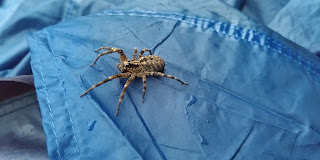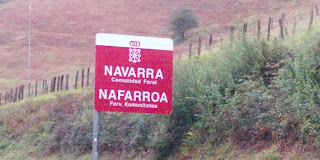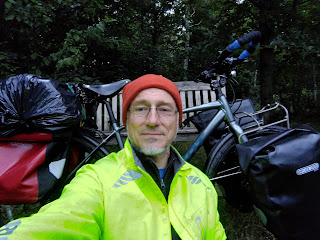Over the Pyrénées 27th September
It rained quite a bit through the night, but thankfully stopped around 9am. The forecast was for it to continue again within the hour so I wasted no time in getting everything packed away. Whilst folding up the tent I came across this impressive creature. Wether he'd actually spent the night in the tent with me or just got caught up in the tent while I was folding it, I cannot say!
Once under way on the bike I have everything in waterproof bags and I wear a waterproof poncho, so, as long as I can pack and unpack my stuff in the dry, the rain is not too much of a problem. Once packed up I called in at the bar for a coffee and to get any news of the road ahead. It was all good, but by the time I was back on the bike it was raining again. My objective for the day was a hostel in the town of Eugi 26km away on the other side of the mountains. Nothing for it but to get stuck in. There are two possible routes to Eugi, one goes via Urupel and the Col de Paradar, but I was told it was very windy and steep, not suitable for me with all my luggage. The other is the main road, D58, through the Col d'Esnazu. The woman in the bar said it would be no trouble for the bike. She walks the route every year taking the village cattle to the high pastures.
On leaving Aldudes the gradient begins almost immediately. Surprisingly my hill climbing gear coped really well and it was not as steep as I had feared. The route to the top was peppered all the way with farmhouses and buildings so that although there was very little motor traffic I never really felt isolated or at risk. At one point I was passed by two small pickup trucks crammed with scrap metal heading for Spain presumably. They had almost as much trouble getting up the slope as I did, so I was quite pleased with myself when I got to the top.
The atmosphere all the while was damp and mysterious, and it was a little disappointing that the visibility was so poor. But the sounds and the smells of this wildly spectacular area filled my senses.
Buzzards and kites were to be seen whenever there was a gap in the clouds, as were many other species of birds, and no shortage of small mammals on the ground for them to feed on. This was a place that was brimming with life.
Crossing in to Spain the landscape changed surprisingly quickly. For one thing the number of habitations reduced noticeably, and forest became the norm, rather than pastoral agriculture which predominated on the French side.
Surprisingly the condition of the road in Spain was much superior, with proper steel crash barriers. I had been alarmed in France by the number of low stone walls, 12-18" high at the edge of the mountain roads. These were fine for cars, but if I'd hit one on my bike I would have gone straight over the top and into the valley below! I remember my Dad telling me that in France they often put up the "uneven road surface sign" rather than go to the trouble of actually repairing the road.
My sister Jenny had told me that Spanish drivers were less aggressive and a bit more vague than the French and I quickly discovered what she meant. Coming in the opposite direction two Spanish cars, both driven by fairly elderly looking gentleman held their position firmly in the centre of the road, keeping away from the edge and the dramatic chasm below. It was more amusing than threatening, but I'm glad I was able to keep the bike under control . Sometimes on the steeper sections the front wheel has a tendency to tack from side to side with the action of pedaling, and if the road is very steep it's quite possible to veer off in one direction or another, and even end up going back down hill.
Going up is entirely different from coming down, so that on the way up the rain helped to keep me cool and my body produced plenty of heat, freewheeling down hill was the exact opposite. The perspiration trapped inside my clothing quickly cooled and the rain stung my face as my speed increased. I had the impression that the air was also colder on this side, which I was not expecting. My thumbs and fingers became numb and my body temperature began to sink rapidly. I had gloves but on account of the rain I considered they would not make much difference, and I risked getting everything wet trying to find them. The rain also meant I didn't want to get the phone wet by taking photos.
But it was exhilarating and the forested landscape was dark and spectacular, occasionally revealing abandoned buildings and industrial enterprises.
Eventually the road lead to the embalse (reservoir) de Eugi, an enormous man made lake that provides fresh water for the city of Pamplona about 20kms away. Judging from the information boards the locals are very proud of their highly oxygenated mountain water, and justifiably so.
Eugi like Aldudes had the atmosphere of an abandoned town, but I'm happy to say that the Hostal was open and had room for me. It is really more like a hotel, very comfortable single rooms, and very helpful staff so I was able to get changed and have a massive hot bath straight away and get my stuff dried out. I discovered subsequently that there is a pilgrims hostel a further 8km down the road at Zubiri which would have cost me half the price I'm paying here, but what the hell. A little luxury doesn't hurt once in a while. But I can't afford to stay more than two nights and the forecast for Thursday still looks very bleak.
I've started swatting up on my Spanish, it's really difficult having to change to a new language and one I am not so familiar with. It demands a lot more patience from the locals. Even so I had a good conversation over breakfast with a guy named José probably of my own age, who was interested in my route and pointed out some of the things I should look out for on my way to Zaragoza.
It took me a little while in France to get used to the fact that every Tom Dick and Harry seems to greet you with a Bonjour and here in Spain it's not much different. To begin with I wondered if it was a kind of affected politeness, but I've gradually come to prefer to view it as an expression of fraternity, encompassed in the national values of Liberté, Égalité et Fraternité, but also going beyond that. I wondered if it was a custom that was engendered following the revolution or wether it goes back further. In any event I think it is a really positive habit, and since coming abroad I have lost all inhibition about asking people for their names. Wether the name remains in memory is immaterial, for the one opportunity of affirming their identity and hence the value of their existence I have found it's very beneficial to pronounce a person's name. It seems always to provoke a smile and an open expression.






